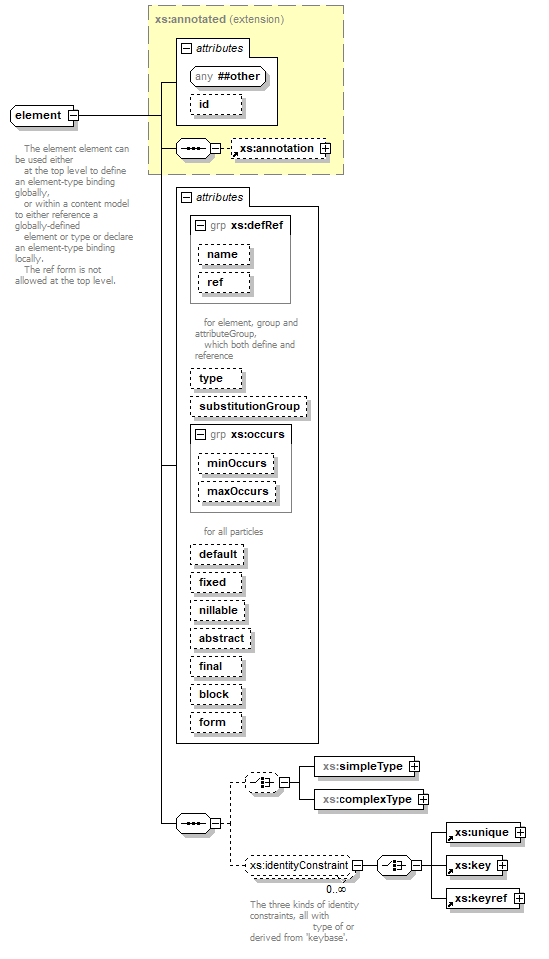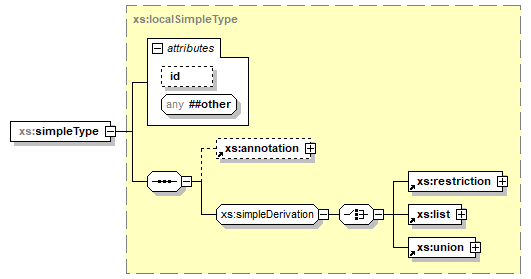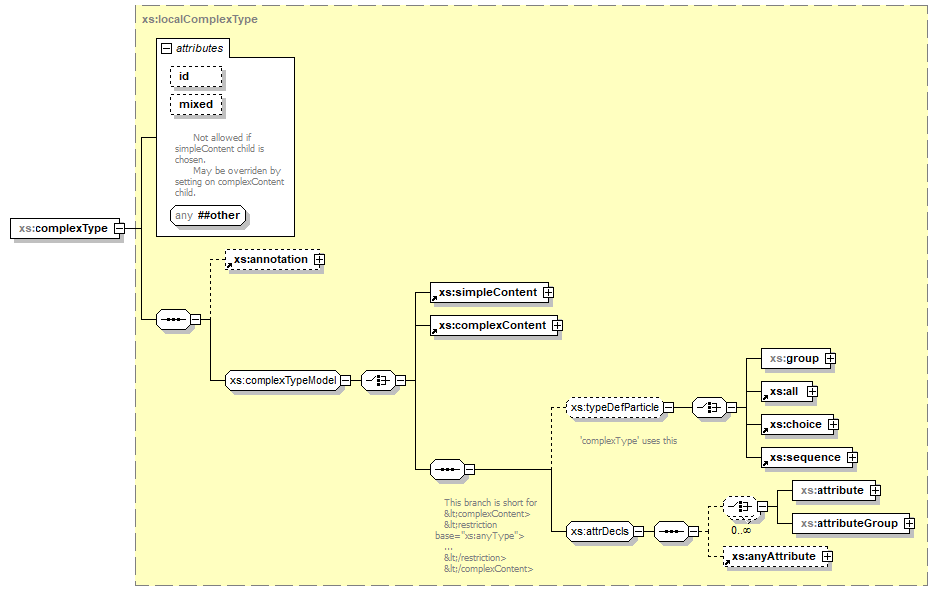| diagram |  |
||||||||||||||||||||||||||||||||||||||||||||||||||||||||||||||||||||||||||||||||||||||||||
| namespace | http://www.w3.org/2001/XMLSchema | ||||||||||||||||||||||||||||||||||||||||||||||||||||||||||||||||||||||||||||||||||||||||||
| type | extension of xs:annotated | ||||||||||||||||||||||||||||||||||||||||||||||||||||||||||||||||||||||||||||||||||||||||||
| properties |
|
||||||||||||||||||||||||||||||||||||||||||||||||||||||||||||||||||||||||||||||||||||||||||
| children | xs:annotation xs:simpleType xs:complexType xs:unique xs:key xs:keyref | ||||||||||||||||||||||||||||||||||||||||||||||||||||||||||||||||||||||||||||||||||||||||||
| used by |
|
||||||||||||||||||||||||||||||||||||||||||||||||||||||||||||||||||||||||||||||||||||||||||
| attributes |
|
||||||||||||||||||||||||||||||||||||||||||||||||||||||||||||||||||||||||||||||||||||||||||
| annotation |
|
||||||||||||||||||||||||||||||||||||||||||||||||||||||||||||||||||||||||||||||||||||||||||
| source | <xs:complexType name="element" abstract="true"> <xs:annotation> <xs:documentation> The element element can be used either at the top level to define an element-type binding globally, or within a content model to either reference a globally-defined element or type or declare an element-type binding locally. The ref form is not allowed at the top level.</xs:documentation> </xs:annotation> <xs:complexContent> <xs:extension base="xs:annotated"> <xs:sequence> <xs:choice minOccurs="0"> <xs:element name="simpleType" type="xs:localSimpleType"/> <xs:element name="complexType" type="xs:localComplexType"/> </xs:choice> <xs:group ref="xs:identityConstraint" minOccurs="0" maxOccurs="unbounded"/> </xs:sequence> <xs:attributeGroup ref="xs:defRef"/> <xs:attribute name="type" type="xs:QName"/> <xs:attribute name="substitutionGroup" type="xs:QName"/> <xs:attributeGroup ref="xs:occurs"/> <xs:attribute name="default" type="xs:string"/> <xs:attribute name="fixed" type="xs:string"/> <xs:attribute name="nillable" type="xs:boolean" use="optional" default="false"/> <xs:attribute name="abstract" type="xs:boolean" use="optional" default="false"/> <xs:attribute name="final" type="xs:derivationSet"/> <xs:attribute name="block" type="xs:blockSet"/> <xs:attribute name="form" type="xs:formChoice"/> </xs:extension> </xs:complexContent> </xs:complexType> |
attribute element/@type
| type | xs:QName | ||
| properties |
|
||
| source | <xs:attribute name="type" type="xs:QName"/> |
attribute element/@substitutionGroup
| type | xs:QName | ||
| properties |
|
||
| source | <xs:attribute name="substitutionGroup" type="xs:QName"/> |
attribute element/@default
| type | xs:string | ||
| properties |
|
||
| source | <xs:attribute name="default" type="xs:string"/> |
attribute element/@fixed
| type | xs:string | ||
| properties |
|
||
| source | <xs:attribute name="fixed" type="xs:string"/> |
attribute element/@nillable
| type | xs:boolean | ||||||
| properties |
|
||||||
| source | <xs:attribute name="nillable" type="xs:boolean" use="optional" default="false"/> |
attribute element/@abstract
| type | xs:boolean | ||||||
| properties |
|
||||||
| source | <xs:attribute name="abstract" type="xs:boolean" use="optional" default="false"/> |
attribute element/@final
| type | xs:derivationSet | ||
| properties |
|
||
| source | <xs:attribute name="final" type="xs:derivationSet"/> |
attribute element/@block
| type | xs:blockSet | ||
| properties |
|
||
| source | <xs:attribute name="block" type="xs:blockSet"/> |
attribute element/@form
| type | xs:formChoice | |||||||||
| properties |
|
|||||||||
| facets |
|
|||||||||
| source | <xs:attribute name="form" type="xs:formChoice"/> |
element element/simpleType
| diagram |  |
||||||||||||
| namespace | http://www.w3.org/2001/XMLSchema | ||||||||||||
| type | xs:localSimpleType | ||||||||||||
| properties |
|
||||||||||||
| children | xs:annotation xs:restriction xs:list xs:union | ||||||||||||
| used by |
|
||||||||||||
| attributes |
|
||||||||||||
| source | <xs:element name="simpleType" type="xs:localSimpleType"/> |
element element/complexType
| diagram |  |
||||||||||||||||||||
| namespace | http://www.w3.org/2001/XMLSchema | ||||||||||||||||||||
| type | xs:localComplexType | ||||||||||||||||||||
| properties |
|
||||||||||||||||||||
| children | xs:annotation xs:simpleContent xs:complexContent xs:group xs:all xs:choice xs:sequence xs:attribute xs:attributeGroup xs:anyAttribute | ||||||||||||||||||||
| used by |
|
||||||||||||||||||||
| attributes |
|
||||||||||||||||||||
| source | <xs:element name="complexType" type="xs:localComplexType"/> |
XML Schema documentation generated by XMLSpy Schema Editor http://www.altova.com/xmlspy